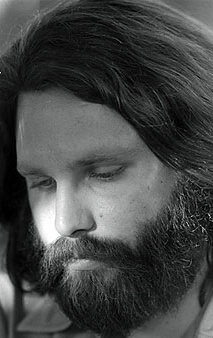Stephen
Davis’s biography Jim Morrison: Life, Death, Legend
examines the singer/poet’s descent (or ascent) into mind-altering
drugs
and alcohol as well as his promiscuity and ambiguous
-- walk on the wild side -- sexuality.
America’s
counterculture provided the background for the emergence of
The Doors in 1966: armed virgins trudging through the jungles
of Viet Nam (provoking in Morrison nightmarish visions and recurrent
dreams) and the spirit of protest that bouyed the beat movement,
the ferment of which morphed into the unique droning sound that
became synonymous with Doors music and the rise of their charismatic
lead singer who embodied, like no one else in his time, the
Dionysian principle. But as the book argues, you ignore the
laws of nature at your own peril: Jim Morrison (1943-1971) was
turned into a god by both adoring fans and media and rocketed
to dizzying heights where he lost his balance and never recovered.
Davis’
book quenches our thirst for titillation and sensationalism
by turning us into veritable peeping toms as we accompany the
Lizard through his wild antics and debauchery. And it doesn't
take long to figure out that Jim Morrison is more about
the man than the band, thus depriving us of juicy details about
by whom and how their
enduring music was created.
LIZARD
ON DEATH ROW
 Being
straight and sober have rarely been a poet and visionary’s
predominant qualities, especially when under the influence of
Rimbaud and Nietzsche, which helps explain Morrison’s
love-hate relationship with death and chaos. Morisson was a
modern sacrificial lamb bearing the burden of being and the
relative insignificance of our lives. Unstable in his life and
unpredictable on stage, he sent The Doors' career spiralling
downward. His band mates, who were gifted improvisers and Coltrane
aficionados, became wary of their leader’s volatility
and with or without him would have liked to milk the cow for
as long as the records sold. But the chemistry underlying their
success was the reason why it couldn’t work that way --
a Catch 22 stuck in a melting pot of genius and torment.
Being
straight and sober have rarely been a poet and visionary’s
predominant qualities, especially when under the influence of
Rimbaud and Nietzsche, which helps explain Morrison’s
love-hate relationship with death and chaos. Morisson was a
modern sacrificial lamb bearing the burden of being and the
relative insignificance of our lives. Unstable in his life and
unpredictable on stage, he sent The Doors' career spiralling
downward. His band mates, who were gifted improvisers and Coltrane
aficionados, became wary of their leader’s volatility
and with or without him would have liked to milk the cow for
as long as the records sold. But the chemistry underlying their
success was the reason why it couldn’t work that way --
a Catch 22 stuck in a melting pot of genius and torment.
An
interesting non-correlation with today’s popular artists
put forward by the author of the book dwells on the fact that
Morrison didn’t care much for material possessions. Despite
his wealth, he never owned a house, often preferred to crash
in run down hotels or on friends’ couches, and was known
to lavish his friends and girlfriend with gifts and money. After
Strange Days (1967), their second album, Morrison grew
increasingly resentful of his stardom and the way he was perceived
by his adoring public. And while he wasn’t completely
indifferent and insensitive to the adulation, he had long grown
beyond ‘light my fire’ and yearned to be recognized
as a poet. If one concedes that his image and rock star status
were a hindrance to his goals beyond, his exceptional sensitivity
and (higher) awareness of these captive categories pushed him
farther on to the self-destructive path.
 Whether
Morrison’s premature demise was brought about by a heroin
overdose as intimated by Davis, or increasing deterioration
of his body due to hard-core alcoholism and all around self-inflicted
abuse is irrelevant to the non-voyeur, for what prevails and
lingers to this day is the artist-poet who wrote constantly
and breathed poetry which he served with integrity, breaching
the fragile hymen of time and ephemeral mass adulation.
Whether
Morrison’s premature demise was brought about by a heroin
overdose as intimated by Davis, or increasing deterioration
of his body due to hard-core alcoholism and all around self-inflicted
abuse is irrelevant to the non-voyeur, for what prevails and
lingers to this day is the artist-poet who wrote constantly
and breathed poetry which he served with integrity, breaching
the fragile hymen of time and ephemeral mass adulation.